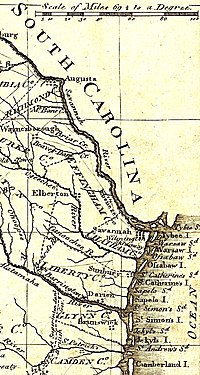| Battle of the Rice Boats | |||||||
|---|---|---|---|---|---|---|---|
| Part of the American Revolutionary War | |||||||
 A 1796 map showing the Savannah area, Hutchinson Island is in the Savannah River near the town. | |||||||
| |||||||
| Belligerents | |||||||
|
|
| ||||||
| Commanders and leaders | |||||||
| Lachlan McIntosh |
Andrew Barclay James Grant | ||||||
| Strength | |||||||
|
| ||||||
| Casualties and losses | |||||||
|
1 wounded 1 fire ship sunk 3 supply ships captured |
Unknown ~2 men-of-war damaged 3 supply ships sunk | ||||||
The Battle of the Rice Boats, also called the Battle of Yamacraw Bluff, was a land and naval battle of the American Revolutionary War that took place in and around the Savannah River on the border between the Province of Georgia and the Province of South Carolina on March 2 and 3, 1776. The battle pitted the Patriot militia from Georgia and South Carolina against a small fleet of the Royal Navy.
In December 1775, the British Army was besieged in Boston. In need of provisions, a Royal Navy fleet was sent to Georgia to purchase rice and other supplies. The arrival of this fleet prompted the colonial rebels who controlled the Georgia government to arrest the British Royal Governor, James Wright, and to resist the British seizure and removal of supply ships anchored at Savannah. Some of the supply ships were burned to prevent their seizure, some were recaptured, but most were successfully taken by the British.
Governor Wright escaped from his confinement and safely reached one of the fleet's ships. His departure marked the end of British control over Georgia, although it was briefly restored when Savannah was retaken by the British in 1778. Wright again ruled from 1779 to 1782, when British troops were finally withdrawn during the closing days of the war.
- ^ Russell, p. 74